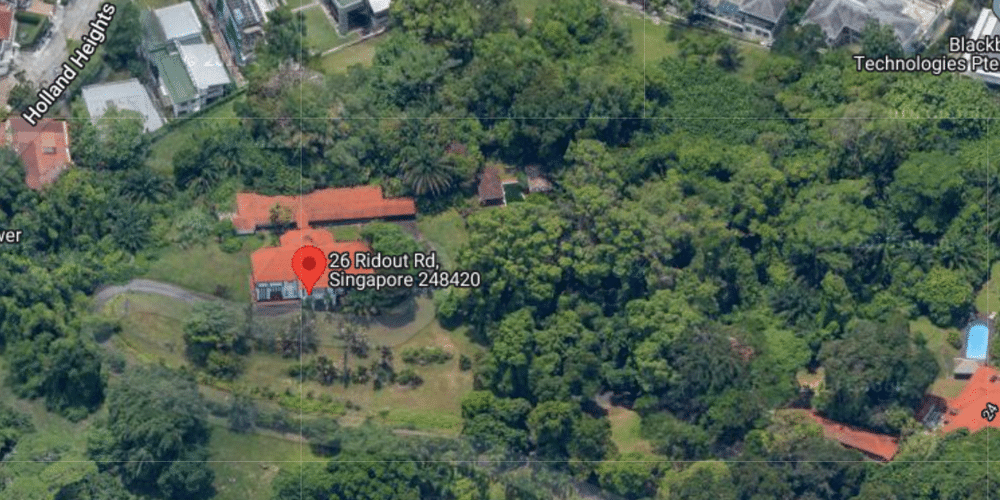The Second Minister for Law, Edwin Tong, provided a detailed account of the refurbishment work associated with 26 and 31 Ridout Road properties, occupied by Ministers K Shanmugam and Vivian Balakrishnan, during his comprehensive ministerial statement on Monday.
The session, which saw four ministerial statements delivered, was convened due to the controversy surrounding the rentals by Mr Shanmugam and Dr Balakrishnan, particularly as Mr Shanmugam, in his capacity as Minister for Law, oversees the Singapore Land Authority (SLA) that manages these properties.
During his statement, Tong elaborated on the renovations conducted on the properties. Both the SLA and the tenants independently commissioned improvement works on these conserved buildings.
SLA engaged external consultants to evaluate the properties’ conditions and delineate the necessary enhancements.
For 26 Ridout Road, the structural improvements, such as bolstering timber beams, rafters, and columns, as well as conserving other heritage elements, amounted to approximately S$375,000. Additional tasks, including painting, pest control, and mould removal, cost about S$140,000. The expense of clearing additional land at 26 Ridout Road was entirely recovered from Shanmugam through the rent accumulated during his tenancy.
The renovation works at 31 Ridout Road, where Balakrishnan resides, involved comprehensive roof repairs and the preservation of heritage features, costing around S$452,000. An additional S$118,000 was spent on various tasks like general staircase and property perimeter repairs, window fixtures, painting, pest control, and even snake combing.
Tong emphasized that Ministers Shanmugam and Balakrishnan invested significant personal funds to enhance their rented properties.
Shanmugam financed the construction of a car park shelter, a 25-meter swimming pool, toilet upgrades, and tree planting, with costs exceeding S$400,000.
Balakrishnan, conversely, expended around S$200,000 on air conditioning, a 10-meter long swimming pool, toilet improvements, and an extension to the property’s garage pavilion, which necessitated approval from the Urban Redevelopment Authority (URA).
Tong stressed that these privately-funded enhancements would revert to state ownership once the tenancies end, as is standard protocol. He argued that the ministers’ considerable capital expenditure had increased the properties’ value.
Massive tree cutting at 26 and 31 Ridout Road
The properties under discussion are located within a Tree Conservation Area, a zone where the felling of any tree with a girth greater than one meter requires approval from the National Parks Board (NParks).
Tong outlined that Shanmugam, the tenant of 26 Ridout Road, had raised concerns about the structural and health conditions of several mature trees during his tenure.
According to a report by Senior Minister Teo Chee Hean, Shanmugam had expressed his worries to the SLA about the potential public health and safety risks from overgrown vegetation, which could harbour snakes, mosquitoes, or falling trees.
Tong noted that these concerns were initially prompted by a neighbour who pointed out potential safety hazards due to decaying and structurally deficient trees.
In response to Shanmugam’s concerns, the Singapore Land Authority (SLA) initiated the tree removal process. The SLA expended around S$172,000 to clear the site of green cover and fencing.
Before any decisions were made about tree removal, an arborist was consulted to evaluate the trees. The inspection reports corroborated the safety concerns, highlighting various issues like decay wounds on the main trunks and buttress roots.
Over the past 4.5 years since Shanmugam started his tenancy, 19 trees with a girth exceeding one meter were removed due to identified safety risks.
Each removal was based on feedback about potential dangers, and 18 of these felling procedures were independently evaluated by arborists and approved by NParks officers who inspected the trees on site.
One tree that collapsed in severe weather was felled without an arborist’s report, but NParks still approved its complete removal.
Tong shared that over the last five years, the property’s managing agent replaced 17 trees, and additional replanting was carried out by the tenant, demonstrating their commitment to maintaining the property’s greenery.
However, satellite imagery indicated a significant reduction in vegetation from 26 Ridout Road and the adjoining 24 Ridout Road within a brief period in June and July 2018, just before the ministers moved in.
Tong clarified that at 31 Ridout Road, prior to Balakrishnan’s tenancy, NParks approved the removal of 24 trees based on an independent arborist’s assessment of their risk of failure and the associated safety concerns.
Satellite photos show that the vegetation was entirely removed from 31 Ridout Road estate in September 2019 before Balakrishnan moved in.
However, neither the SLA nor the ministers disclosed the expenditure for clearing the 31 Ridout Road property before Balakrishnan took up residence.
Lim Tean, Peoples Voice chief, had previously criticised the felling of trees at the estates. He stressed that the felled trees, which may have been there for over a century, formed part of the property’s character.
“If a person does not like trees or cannot tolerate the thought that there might be snakes or mosquitoes in the vicinity of his house, he has no business living in a B&W,” wrote Mr Lim.









